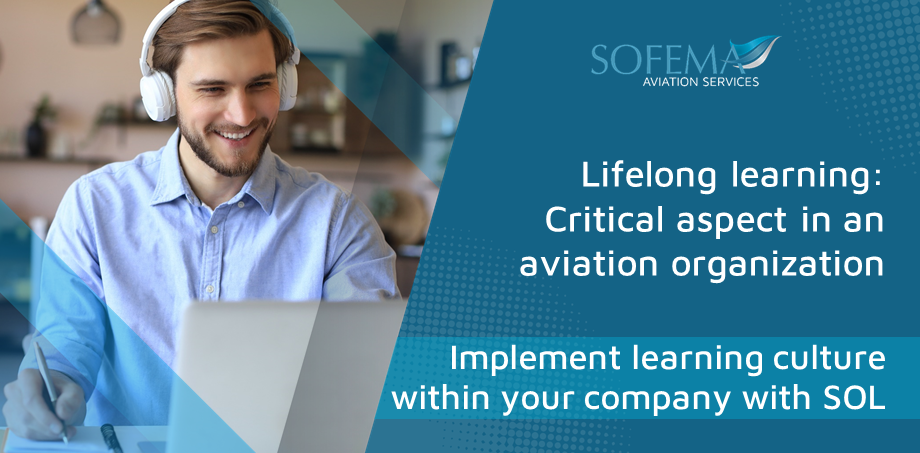Steve Bentley (FRAeS) and CEO of Sofema Aviation Services (SAS) www.sassofia.com and Sofema Online (SOL) www.sofemaonline.com looks at the importance of embracing lifelong learning as a fundamental aspect of your career development decisions.
Introduction
Lifelong learning is critical within an aviation organization, particularly for the leadership team. It helps to keep employees updated on industry developments, enhances their knowledge and skills, and ensures that they are equipped to deal with any challenges that may arise in the future.
By implementing strategies to support lifelong learning and regularly assessing their impact, organizations can ensure that their leadership team and employees are well-equipped to navigate the ever-changing landscape of the aviation industry.
How to Drive Lifelong Learning within the Organisation
Promoting lifelong learning within an aviation organization requires a clear understanding of the benefits of ongoing training and development. This can be achieved through effective communication of the organization’s goals and objectives and the role that training and development play in achieving these goals. Providing opportunities for training and development and encouraging employees to participate in them is another way to promote lifelong learning within an organization. Consider the following Specific Steps to support your organisational objective:
- Create a culture that values learning and development by promoting it as an integral part of the organization’s DNA. Encourage continuous learning and provide opportunities for employees to grow and develop their skills and knowledge.
- Provide employees with opportunities to participate in training and development programs, such as workshops, seminars, and online courses. These programs should be designed to meet the specific needs of the organization and its employees.
- Encourage employees to seek out mentors and coaches who can help them learn new skills and provide guidance and support. Mentors can provide valuable insights and advice based on their own experiences.
- Encourage employees to take ownership of their learning by providing them with the resources and tools they need to pursue self-directed learning. This includes access to books, articles, videos, and other learning materials.
- Recognize and reward employees who demonstrate a commitment to learning and development. This can be done through formal recognition programs, promotions, or other incentives.
- Leaders within the organization should lead by example by demonstrating a commitment to learning and development. They should participate in training and development programs and promote a culture of learning within the organization
How to Measure the Benefits of Lifelong Learning?
Measuring the benefits of lifelong learning can be challenging, but it is essential to do so to justify the investment in training and development. One way to measure the benefits is to track the performance of individuals and teams who have participated in training and development programs. Another way is to conduct surveys to gather feedback from employees on the impact of training and development on their work performance. Consider the following to support the development of Lifelong Learning Metrics:
- Cognitive abilities: Assess improvements in memory, critical thinking, and problem-solving skills.
- Self-confidence: Monitor increases in self-esteem, self-efficacy, and general well-being.
- Personal growth: Observe the development of new interests, hobbies, and perspectives.
- Adaptability: Evaluate the ability to adjust to new situations and embrace change.
In terms of Professional and Specific Organisational Benefits consider the following:
- Career advancement: Track promotions, salary increases, or transitions to new job roles.
- Skill development: Assess the acquisition of new skills or enhancement of existing ones.
- Networking: Evaluate the growth and quality of professional networks.
- Job satisfaction: Monitor improvements in overall job satisfaction and engagement.
There will typically be additional economic benefits from lifelong Learning Activities consider the following as examples of such benefits:
- Income: Measure changes in income, financial stability, and economic mobility.
- Employment opportunities: Assess the increase in job prospects and opportunities for career advancement.
- Job market relevance: Evaluate how well individuals can adapt to the changing job market and maintain their competitiveness.
What Can Sofema Online Do for Your Lifelong Learning Organisational and Personal Aspirations?
- Sofema Online (www.sofemaonline.com) offers a wide range of training courses for aviation professionals, including leadership training.
- These courses are designed to help aviation professionals develop the skills and knowledge they need to succeed in their roles.
- They cover a range of topics, including aviation regulations, safety management systems, and leadership development.
Sofema Online’s courses are designed to be flexible and accessible, allowing aviation professionals to learn at their own pace and on their own schedule. The courses are delivered online, making them ideal for busy aviation professionals who may not have the time or resources to attend traditional classroom-based training.
By offering high-quality training courses, Sofema Online can support the objective of promoting lifelong learning within an aviation organization. The courses are designed to provide employees with the knowledge and skills they need to succeed in their roles, helping them to stay up-to-date with industry developments and to meet the challenges of the future.
Next Steps
Please visit our websites www.sassofia.com or www.sofemaonline.com or email us at team@sassofia.com
Tags:
aviation, Compliance, EASA, Online Training, Sofema Online, Aviation regulatory training, SOL Training, classroom training, Aviation Professionals, Sofema Online (SOL), Lifelong Learning





